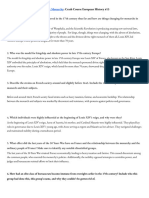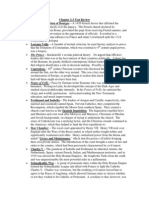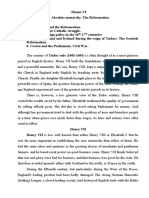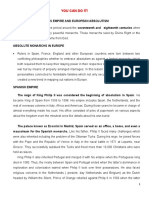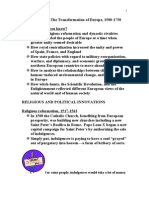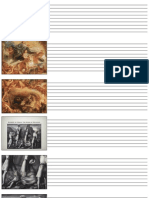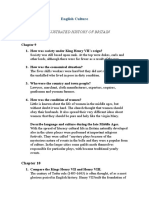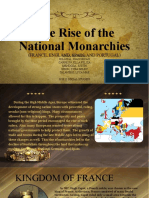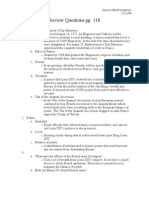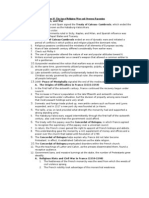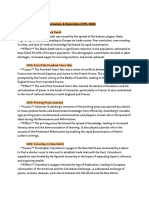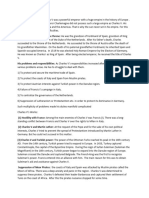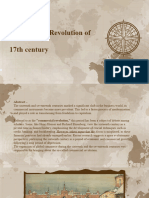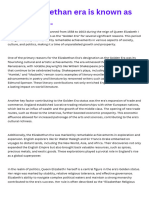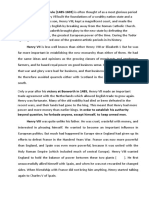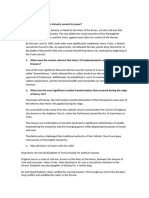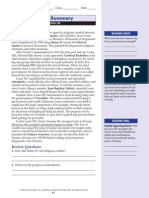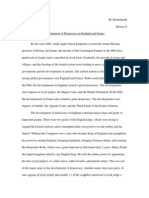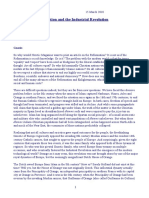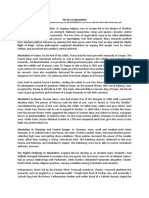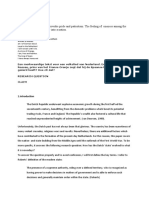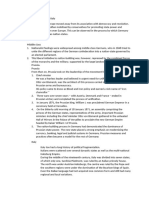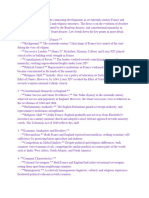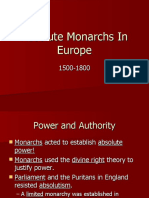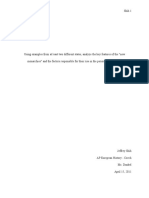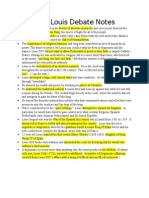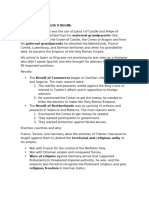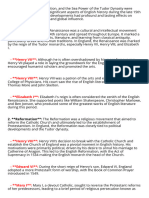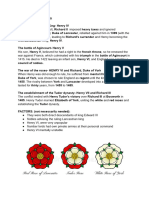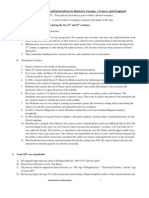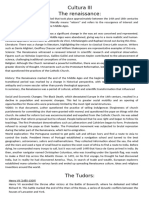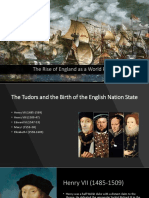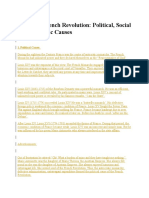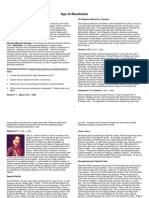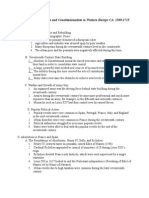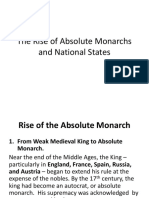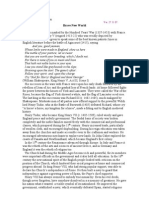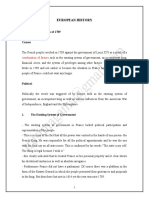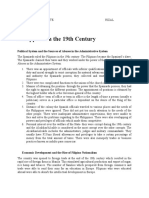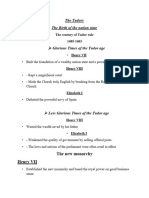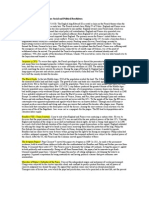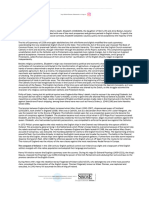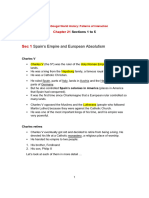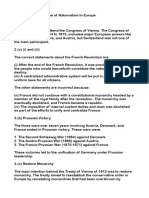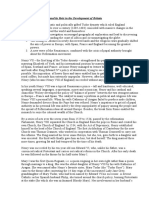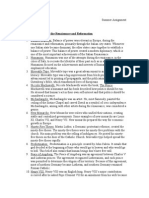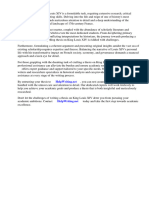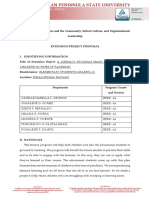Essay Topic 1 Lion and Fox
Essay Topic 1 Lion and Fox
Uploaded by
animelifeCopyright:
Available Formats
Essay Topic 1 Lion and Fox
Essay Topic 1 Lion and Fox
Uploaded by
animelifeCopyright
Available Formats
Share this document
Did you find this document useful?
Is this content inappropriate?
Copyright:
Available Formats
Essay Topic 1 Lion and Fox
Essay Topic 1 Lion and Fox
Uploaded by
animelifeCopyright:
Available Formats
Essay Topic 1: A Lion and a Fox In Machiavellis literary work The Prince, he suggests that an ideal ruler should
behave like a lion and like a fox in order to defend their country while being shrew and intelligent. Henry IV of France and Elizabeth I of England both share attributes that make them successful rulers according to Machiavellis theory. Elizabeth I and Henry IV were able to establish religious tolerance in England and France respectively, create significant foreign and domestic policies, as well as stabilizing England and Frances economies. Henry IV and Elizabeth I established several policies that emphasized the idea of religious tolerance which led them to be recognized as successful rulers. By following Machiavellis suggestion, these two absolute monarchs successfully created religious tolerance like a lion and like a fox. An example of Henry IV using his power like a lion is when he issued the Edict of Nantes of 1598. This document granted the Huguenots liberty of public worship and conscience in specific, fortified towns further emphasizing the idea of religious tolerance. Elizabeth I acted like a fox when she had established a centralized Episcopal system so that religious extremes were not permitted. She also avoided Catholic and Protestant extremes so she would remain neutral. This idea allowed her to avoid confrontation between either group. An example of Elizabeth I ruling like a lion is when she signed the Conventicle Act of 1593 which gave separatists the option to either accept the Church of England or to face exile. Although it would be considered a harsh move, the act managed to establish peace and maintain her desired idea of religious tolerance. As Henry IV and Elizabeth I established religious tolerance successfully; this also led to a prosperous economy in both France and England. The economies of France and England became stable and were considered prosperous during the reign of Henry IV and Elizabeth I. Henry IV made a fox-like decision when he arranged a favorable trade treaty with Turkey. This allowed French merchants to expand trade opportunities in the Mediterranean as well as the establishment of a Navy particularly in the city of Toulon. An example of Henry IV creating economic stability like a lion came from the help of his finance minister the Duke of Sully. Henry IV managed to reform the tax collection system to make it more efficient, this also improved transportation, create prosperity, and stimulate trade and industry within France. Elizabeth I made a fox-like decision by expanding trade overseas, which led to growth in the merchant community. England primarily traded wool with luxuries from the Dutch and French increasing their prosperity. Overseas trade also promoted private shipbuilding and advances in navigational technology. Both Henry IV and Elizabeth I established prosperous economies during their reign; however, in order to be successful politically, they had to establish multiple foreign and domestic policies demonstrating their power and wit. As absolute monarchs, Henry IV and Elizabeth I remained as powerful political rulers by creating foreign and domestic policies during their reign to decide their countrys fate. Using fox-like qualities, Elizabeth I, refused to marry Philip II of Spain. One of her reasons behind this was to ensure her rule of England, if she were to marry him; Philip would have power over her. Elizabeth Is second reason was to maintain England as a Protestant country rather than becoming a Catholic country like the reign of her sister, Mary I. An example of Elizabeth I ruling like a lion is when she passed the Act of Supremacy repealing all anti-Protestant legislation of Mary Tudor; this gave Elizabeth I the right as Supreme Ruler. Henry IV used fox-like qualities when he formed an alliance with the German Protestants of the Evangelical Union in 1610. He did this to prepare for war in order to prevent the alliance between Spain and the Habsburg families of Austria. In general, Elizabeth I and Henry IV made powerful and intelligent decisions that shaped the history of their country. By following Machiavellis theory, Henry IV of France and Elizabeth I of England shared policies that made them successful during their reign. Both of these absolute monarchs managed to establish religious tolerance, create foreign and domestic policies, as well as stabilizing the economies of France and England, respectively. Machiavellis theory of an ideal ruler acting like a lion and like a fox, demonstrates how a monarch needs to be powerful and dominant, yet shrew and wise in order to be successful. In conclusion, Machiavellis ideas are historically significant because they demonstrate how monarchs such as Elizabeth I and Henry IV followed his guidelines and became known as some of the most important leaders in European history.
You might also like
- MURPHY, M. C. (2018) - Holy, Holy, Holy. Divine Holiness and Divine Perfection. Religious Studies, 1-25Document25 pagesMURPHY, M. C. (2018) - Holy, Holy, Holy. Divine Holiness and Divine Perfection. Religious Studies, 1-25Zdravko JovanovicNo ratings yet
- CCEH #13 Absolute MonarchyDocument3 pagesCCEH #13 Absolute Monarchyalvinvarghese8aNo ratings yet
- Chapter 2-3 GuideDocument3 pagesChapter 2-3 Guideahyeah2014No ratings yet
- Theme VI The UKDocument23 pagesTheme VI The UKIraNo ratings yet
- Unit 2Document17 pagesUnit 2rose dela cruzNo ratings yet
- Or Some People, Indulgences Would Take A Lot of MoneyDocument17 pagesOr Some People, Indulgences Would Take A Lot of MoneyChristina NguyenNo ratings yet
- додаткові завданняDocument3 pagesдодаткові завданняАнастасияNo ratings yet
- Chapter 12 Study GuideDocument6 pagesChapter 12 Study GuideBrandon OglesbyNo ratings yet
- CHAPTER 14 - Crisis and Absolutism in EuropeDocument25 pagesCHAPTER 14 - Crisis and Absolutism in EuropeJonathan Daniel KeckNo ratings yet
- English Culture x2Document4 pagesEnglish Culture x2Ruthy GutierrezNo ratings yet
- An Illustrated History of Britain: English CultureDocument4 pagesAn Illustrated History of Britain: English CultureRuthy GutierrezNo ratings yet
- Group 4 - The Rise of The National MonarchiesDocument27 pagesGroup 4 - The Rise of The National MonarchiesZyra Milky Araucto SisonNo ratings yet
- Review Questions Pg. 118Document2 pagesReview Questions Pg. 118Eamon BarkhordarianNo ratings yet
- Chapter 15 Notes AP EuroDocument11 pagesChapter 15 Notes AP Eurodrea4152100% (2)
- Timeline FOR AP EUROPEAN HISTORYDocument12 pagesTimeline FOR AP EUROPEAN HISTORYAanya PatelNo ratings yet
- Charles 5Document3 pagesCharles 5Mustakin KutubNo ratings yet
- Commercial Revolution of The 17th Century (Final)Document28 pagesCommercial Revolution of The 17th Century (Final)Priya YadavNo ratings yet
- Why Elizabethan Era Is Known As Golden Era.. - 20230902 - 224451 - 0000Document7 pagesWhy Elizabethan Era Is Known As Golden Era.. - 20230902 - 224451 - 0000Kazi Nazmoon Nahar HabibiNo ratings yet
- Henry VII Is Less Well Known Than Either Henry VIII or Elizabeth I. But He WasDocument7 pagesHenry VII Is Less Well Known Than Either Henry VIII or Elizabeth I. But He WasDiana ChernyashchukNo ratings yet
- AP Euro Study Guide Chapter 12Document4 pagesAP Euro Study Guide Chapter 123l39h4ntNo ratings yet
- Final OralDocument4 pagesFinal OralChristian ValdirioNo ratings yet
- The Medieval University:: Scholasticism & Urban Intellectual LifeDocument61 pagesThe Medieval University:: Scholasticism & Urban Intellectual LifeyangliNo ratings yet
- Topic 8, The Birth of Modern StatesDocument41 pagesTopic 8, The Birth of Modern StatesantoniodemoraNo ratings yet
- Sec2 SummaryDocument1 pageSec2 Summaryapi-263290130No ratings yet
- England and France Develop Essay 1 2Document3 pagesEngland and France Develop Essay 1 2api-249849360No ratings yet
- The Reformation - Will It Be Relinquishe PDFDocument14 pagesThe Reformation - Will It Be Relinquishe PDFAbenis100% (1)
- AbsolutelyDocument2 pagesAbsolutelyElsa Pajayat AlipinNo ratings yet
- Minor Notes 2Document8 pagesMinor Notes 2mohanamaljith00No ratings yet
- National Anthems Tend To Provoke Pride and Patriotism. The Feeling of Oneness Among The People Binds Them Together Into A NationDocument5 pagesNational Anthems Tend To Provoke Pride and Patriotism. The Feeling of Oneness Among The People Binds Them Together Into A Nationikbenlina_63No ratings yet
- The Making of Germany and ItalyDocument3 pagesThe Making of Germany and Italyingapunga67No ratings yet
- French Ascendency + Louis 14Document30 pagesFrench Ascendency + Louis 14aparupawork22No ratings yet
- Absolute Monarchs in EuropeDocument34 pagesAbsolute Monarchs in EuropeAzimul Aktar BarbhuiyaNo ratings yet
- The New Monarchies of 1450 To 1550 - PaperDocument7 pagesThe New Monarchies of 1450 To 1550 - PaperJeffrey's WhatShihsaidNo ratings yet
- King Louis Debate NotesDocument1 pageKing Louis Debate NotesAmandaQuachNo ratings yet
- Historia Tema 7Document7 pagesHistoria Tema 7cbermudezgallinadNo ratings yet
- The Renaissance - Docx - 20231004 - 153600 - 0000Document2 pagesThe Renaissance - Docx - 20231004 - 153600 - 0000Kazi Nazmoon Nahar HabibiNo ratings yet
- Louis Xiv Thesis StatementDocument5 pagesLouis Xiv Thesis Statementkarenharkavyseattle100% (2)
- The War of The Roses, Tudors, The Elizabethan Age and TheatreDocument7 pagesThe War of The Roses, Tudors, The Elizabethan Age and TheatrechiaralafaucipecoractNo ratings yet
- Absolutism and Constitutionalism in Western Europe - France and EnglandDocument6 pagesAbsolutism and Constitutionalism in Western Europe - France and EnglandmsG77100% (1)
- Cultura IIIDocument7 pagesCultura IIISelene Gonzalez CastilloNo ratings yet
- The Rise of England As A World PowerDocument12 pagesThe Rise of England As A World PowerCarlota DcpNo ratings yet
- The Sixteenth Century (1485-1603)Document4 pagesThe Sixteenth Century (1485-1603)GiorgiaLoretti100% (1)
- Causes of French RevolutionDocument4 pagesCauses of French RevolutionShabnam BarshaNo ratings yet
- Age of AbsolutismDocument18 pagesAge of Absolutismsaqueeb111No ratings yet
- Chapter 16 Outline AP EuroDocument2 pagesChapter 16 Outline AP EuroAndrew TreulichNo ratings yet
- The Rise of Absolute Monarchs and National StatesDocument21 pagesThe Rise of Absolute Monarchs and National Statesเอกรัตน์ โสภณพาณิชNo ratings yet
- Modern EnglishDocument33 pagesModern EnglishgpujasNo ratings yet
- European History: The French Revolution of 1789Document77 pagesEuropean History: The French Revolution of 1789Ruvarashe MakombeNo ratings yet
- Baby Josh AssignmentDocument4 pagesBaby Josh AssignmentJohn Edward EscoteNo ratings yet
- HistoryDocument12 pagesHistorylotishvilisaba1No ratings yet
- APEURO Study SheetDocument20 pagesAPEURO Study SheetirregularflowersNo ratings yet
- Examination Questions On Period FiveDocument8 pagesExamination Questions On Period FiveMiguel MartinezNo ratings yet
- 6 The Elizabethan AgeDocument2 pages6 The Elizabethan AgeHeart BrokenNo ratings yet
- Chapter 21 Student Notes - Holt Mcdougal World History Patterns of InteractionDocument33 pagesChapter 21 Student Notes - Holt Mcdougal World History Patterns of Interactionadham2moemenNo ratings yet
- History Holiday HomeworkDocument17 pagesHistory Holiday Homeworkpatrasrijit28No ratings yet
- Lecture 6. The Tudor DynastyDocument2 pagesLecture 6. The Tudor DynastyОлесяNo ratings yet
- Tudors CultureDocument13 pagesTudors CultureCarola SoldanoNo ratings yet
- Gavin Preller Final Summer AssignmentDocument5 pagesGavin Preller Final Summer Assignmentgavinp9753No ratings yet
- Features of Tudor DynastyDocument13 pagesFeatures of Tudor DynastyafreenmavoorNo ratings yet
- King Louis Xiv ThesisDocument5 pagesKing Louis Xiv Thesisafktmcyddtthol100% (2)
- Debit Card Discount List - 5 August 2024Document13 pagesDebit Card Discount List - 5 August 2024Taha ZeeshanNo ratings yet
- A Survey on Blockchain Technology Evolution Architecture and SecurityDocument26 pagesA Survey on Blockchain Technology Evolution Architecture and SecuritylilaNo ratings yet
- Types of Sentences - Answer KeyDocument3 pagesTypes of Sentences - Answer KeyMaiElGebaliNo ratings yet
- Chapter 1 - What Is Software TestingDocument5 pagesChapter 1 - What Is Software TestingAamir AfzalNo ratings yet
- PA NaOHDocument3 pagesPA NaOH9547n7vym6No ratings yet
- The Zara Brand StrategyDocument13 pagesThe Zara Brand StrategyAkansha PanwarNo ratings yet
- Dungeon! House Rules and Ten Ton of Fun!Document2 pagesDungeon! House Rules and Ten Ton of Fun!macaquinho.No ratings yet
- Case Study - Decison MakingDocument1 pageCase Study - Decison Makingjme_pescasioNo ratings yet
- Conflict Analysis Guidelines Public VersionDocument44 pagesConflict Analysis Guidelines Public VersionNaveed UllahNo ratings yet
- E-Tailing - A Promising Approach in Indian Retail Industry-FULL PAPERDocument12 pagesE-Tailing - A Promising Approach in Indian Retail Industry-FULL PAPERgprakash_mNo ratings yet
- Scouts and Nature: "Nature Study Is The Key Activity in Guiding and Scouting"-Baden PowellDocument5 pagesScouts and Nature: "Nature Study Is The Key Activity in Guiding and Scouting"-Baden PowellDinnar Diandra ATNo ratings yet
- Definition of MotivationDocument7 pagesDefinition of MotivationVaishnavi Reddy JNo ratings yet
- Analisis Koko 5Document6 pagesAnalisis Koko 5REHAN SUWARNI BINTI ABU BAKAR KPM-GuruNo ratings yet
- Trip To ATLANTA: United Travelers Are Required To Wear A Face CoveringDocument5 pagesTrip To ATLANTA: United Travelers Are Required To Wear A Face CoveringLight StarkNo ratings yet
- Class - IX Prose 1 The Sound of MusicDocument2 pagesClass - IX Prose 1 The Sound of MusicNeetu JainNo ratings yet
- RP 2001E Manual de Instalacion 52985 - PDFDocument132 pagesRP 2001E Manual de Instalacion 52985 - PDFSergio Dal DossoNo ratings yet
- Tonkotsu RamenDocument3 pagesTonkotsu RamenghisaNo ratings yet
- History of BakingDocument13 pagesHistory of Bakinglalagozo88% (17)
- Nature Book PDFDocument2 pagesNature Book PDFBharatiyulam100% (1)
- Module 3 - Preferential TaxationDocument8 pagesModule 3 - Preferential Taxationsweetzaira.madejanonNo ratings yet
- Universidad Nacional Hermilio Valdizan Centro de IdiomasDocument6 pagesUniversidad Nacional Hermilio Valdizan Centro de IdiomasMilagrosVelasquezMoralesNo ratings yet
- Central Office: Capitol Compound, Tenejero, City of Balanga 2100 BataanDocument6 pagesCentral Office: Capitol Compound, Tenejero, City of Balanga 2100 BataanPrincess Joy G. PagtalunanNo ratings yet
- Diti Banerjee: Contact:6291654089Document5 pagesDiti Banerjee: Contact:6291654089HRD CORP CONSULTANCYNo ratings yet
- Floriculture - HorticultureDocument5 pagesFloriculture - HorticultureRodmar EscolanoNo ratings yet
- AmazonDocument1 pageAmazonAAYUSHI VERMA 7ANo ratings yet
- 1 Discuss and Critically Evaluate The Major Factors Shaping The Development and Evolution of Retail Financial Services Around The WorldDocument3 pages1 Discuss and Critically Evaluate The Major Factors Shaping The Development and Evolution of Retail Financial Services Around The WorldLATOYA PHILIP100% (1)
- Energy and SustainabilityDocument69 pagesEnergy and SustainabilityPritvik PremkumarNo ratings yet
- Year Seven Second Term 2024Document80 pagesYear Seven Second Term 2024leviokoronkwo123No ratings yet
- Inspection Quarter Booking Manual - 07032011Document41 pagesInspection Quarter Booking Manual - 07032011Rahul KumarNo ratings yet

